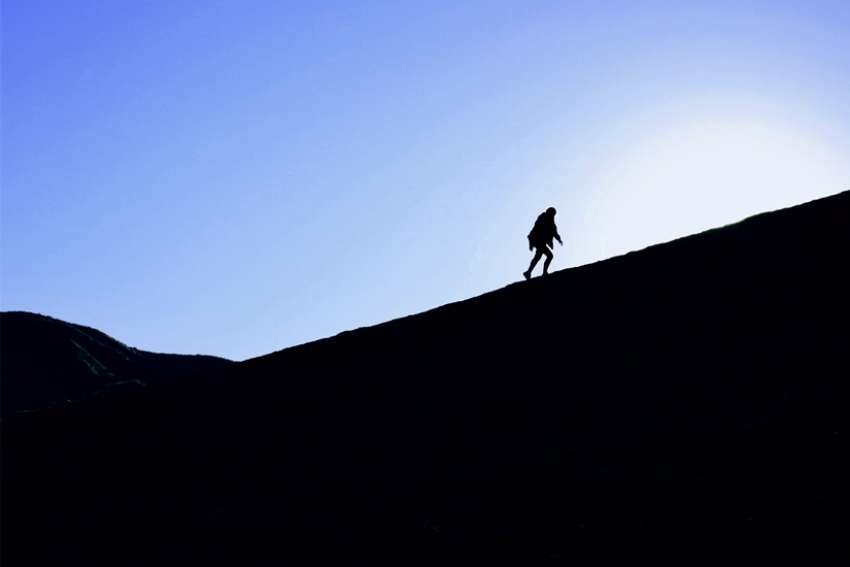“She” is the young woman, Much-Afraid, daughter of the Fearing family, who is journeying up the mountain where she will receive a new name and “feet like a deer’s that can leap upon the heights” (Habakkuk 3:19; Psalm 18:33). Much-Afraid is the protagonist in the novel Hinds’ Feet on High Places. Hannah Hurnard’s 1955 story was inspired by the influential 17th-century allegory The Pilgrim’s Progress, by Christian spiritual tradition and by the author’s personal experience of becoming spiritually mature and able to stand and walk upon the heights.
Fear is a natural and useful emotion, but can become a prison-master and tyrant. Like Much-Afraid, many of us come from the Fearing family and give ear to her cousin Craven Fear. This is not fear of a particular reality, the helpful companion motivating us to avert danger, but a generalized, nameless, pervasive fear that keeps us from living. Without our recognizing it, we become entrapped, paralyzed and imprisoned.
Fear can keep us from climbing the mountain of life, the mountain we must climb to come closer to God, others and ourselves — to the abundant life for which Jesus came among us (John 10:10). Much-Afraid, who fears the climb, is offered companions: two tall, stern figures, Sorrow and Suffering. She shrinks back before accepting them; they are unwelcome, but essential. The fear that would keep us at the bottom is the greater suffering. It can bring a terrible shame, causing more anguish.
Feeling afraid to the point of paralysis, in a time of heightened violence, anxiety and loudly-clashing ideals, is normal. We may be tempted to retreat into theory and fantasy, to stay indoors, like a growing number of our youth. Feeling afraid in the Church is understandable, when we cannot help but see corruption there too — financial, sexual, but above all spiritual corruption.
As Henri Nouwen points out, “one of the greatest temptations is to use our faith as a way to exercise power over others and thereby supplant God’s commandments with human commandments.”
Spiritual corruption is dastardly because it deliberately gets between a person and God, usurping God’s place and confounding and confusing what is deepest and vital in that person. The Synoptic gospels all record Jesus as giving a terrifying warning about such atrocious activity: “If any of you put a stumbling block before one of these little ones who believe in me, it would be better for you if a great millstone were hung around your neck and you were thrown into the sea” (Mark 9:42).
Whom can we trust, including ourselves, inclined as we all are to corruption? We may want to run from the burning flames, like the Australians caught in wildfires. In some circumstances, what else is possible? We may want to find and fortify safe places, build berms, fence ourselves in for survival. Sometimes, there’s nothing else to do.
As Bishop Robert Barron notes in his Letter to a Suffering Church, knowing the best course of action is difficult, and we must be patient with one another. He painstakingly demonstrates similar times down through Church and human history. We can learn from those who went before us, in facing corruption and the daunting task of renewal.
Visiting Lourdes, once, I learned that the great buildings and institutions, commerce and glow-in-the-dark rosaries are not the heart of the story, but only aspects. Looking across the river to the church, I saw the foundation on which all is built: the cave of rock where a courageous young nobody had an encounter with one she dared not claim as the Mother of God, but who claimed her as one would suffer for the healing of many.
When Much-Afraid encounters her Shepherd face-to-face on the heights, she wonders whether “you purposely allow us to be brought into contact with the bad and evil things that you want changed. Perhaps that is the very reason that we are here in this world, where sin and sorrow and suffering and evil abound.”
It’s no joke to climb the mountain of human life, to mature in spirituality and faith or to take up our mission in the world. Not the world we wish we had, but the world we actually are in — the only one we can help. Suffering and Sorrow, and Fear in its place, can be allies and can have new names too, as Much-Afraid learned. The trick is not to take the path alone; “behold, I am with you always, until the end of time” (Matthew 28:20).
Can we help each other have this faith and this way of living?
“God, my Lord, is my strength; He makes my feet swift as those of deer and enables me to tread upon the heights” (Habakkuk 3:19).
(Marrocco can be reached at marrocco7@sympatico.ca)


